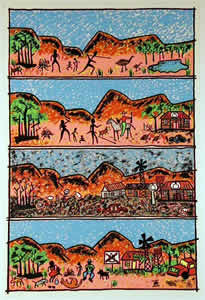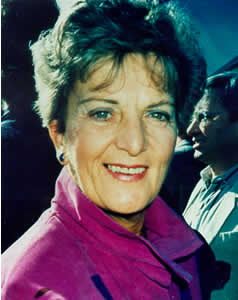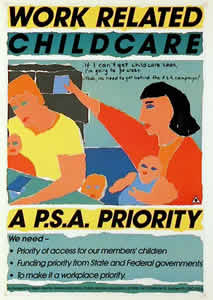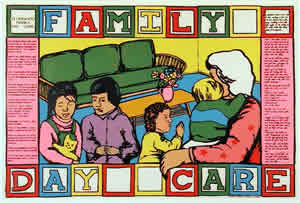
Art posters in the 1970s and 1980s provided a means that helped to ignite and shape conscience and ideals. Some emanated from disaffected artists wanting to make visible their stand, while clients for national campaigns or community advertising commissioned others.
Hazel Hawke's informed interest in the humanist and social themes of life, and her desire to make these central to her role as wife of the Prime Minister, meant that through her voice she had something in common with the bold and impassioned messages and imagery emblazoned on art posters.
The point of intersection in the voice of Hazel Hawke and the ideals of poster or street art is not always in content, though this is sometimes the case. More so it is in the way that with hindsight they each can be understood to have offered a public maturing within the Australian context of freedom of speech, particularly on the position of women and Aboriginality.
'From the moment of their enthusiastic adoption by oppositional groupings mobilised against war in Vietnam, by feminists and by conservation groups, screenprinted posters have been the heart and soul of oppositional printmaking in this country.'
Julie Ewington
From opposite points in the social spectrum of Australia - Hazel Hawke in the Lodge and the poster collectives dotted around the country in makeshift or recycled premises - each mediated distinct rites of passage in the expansion of ideas for a generation of Australians.
Margaret Moore, Exhibition Curator

Michael
Callaghan, Redback Graphix
Beat the grog #1, 1986
Silkscreen print, 63 x 93.5 cm
Kerry Stokes Collection, Perth
Photograph: JCPML00772/3

Photograph:
John Curtin
Prime Ministerial Library.
Records of Hazel Hawke. Hazel Hawke at Bondi
Pavillion, 1987. JCPML00425/58

Alison
Alder, Redback Graphix.
Work related childcare, 1986.
Offset print 42 x 59.4 cm
Kerry Stokes Collection, Perth
Photograph: JCPML00772/3

Mark
Denton, Redletter Posters
Family day care, nd
Silkscreen print, 76.5 x 51 cm
Curtin University of Technology Art Collection
Photograph: JCPML00772/3